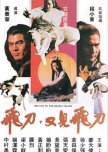
"I'm not old, I'm just mature"
Return of the Deadly Blade was the equivalent of click bait for me. The cast included Kurata Yasuaki, Norman Chu, and Lo Lieh. And then it hit me with the discombobulation virus, which lasted around 90 minutes.Master Li aka The Deadly Blade killed “Kam the Invincible Gold Rings” in a duel and then went into hiding for twenty years. Now suddenly everyone is looking for the famed bladesman. Siu Wan begins his trek to find Master Li taking on contenders as he goes. The Lonely Killer, a roguish lady’s man, is also looking for Master Li. He’s followed by a female fighter he defeated who apparently developed the kind of crush that could kill. A nobleman dressed in gold lame, which means you can’t trust him, sends out men to assassinate Lonely Killer, including a ninja. Siu Wan and LK keep crossing each other’s paths as does the lovesick warrior and a damsel in distress. All roads lead to the Tomb of the Hero and the showdown to discover, “Who’s your daddy?”
The story was convoluted and badly edited. Maybe there’s a longer version out there that tied the plot elements together better, but this version was disjointed and didn’t explain things well. Kurata Yasuaki finally had a role where he wasn’t a diabolical villain. Lonely Killer was no angel but usually Kurata played a burn down the orphanage kind of character in old kung fu movies. Kurata is skilled in karate and other forms of martial arts and his moves displayed his skill despite the limited hand-to-hand action. David Chiang as Siu Wan was David Chiang, I was never a fan of his work in these older movies. Reliable Norman Chu appeared as the wheelchair bound Master Li, a man tired of killing. Lo Lieh surfaced briefly as an umbrella fighting warrior who had to fight against Siu Wan and LK. While it saddened me that Lo was often relegated to smaller roles after the 1970’s I always enjoy seeing him on the screen. In a blink and you’ll miss him moment, Hwang Jang Lee was featured in the intro as Kam and his golden rings. Flora Cheung played both ingenue and femme fatale.
Since the writers didn’t make the story very clear, the action had to carry the movie along. Kurata had a fun fight against the Famous Four in a cave hot springs tub. Epic towel fight. He later had to face Bruce Leung in a cameo role. The three-way fight between Kurata, Chiang, and Lo Lieh was well choreographed. Later, when Kurata faced a ninja and the vengeful nobleman on a rope bridge, it felt like more could have been done with it. The grand finale fight that included quite a bit of wirework was a letdown.
Return of the Deadly Blade squandered a strong cast with a badly edited story. The most compelling reason to watch it is to see Kurata Yasuaki be able to play a lighter character than usual. Not a solid reason, but for fans of the genre a reason to try it.
15 March 2024
Was this review helpful to you?
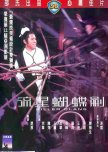
"A friend's weapon is the most fatal"
“Killers are like meteors. They appear in brilliance and vanish in no time. And they don’t have names.” Based on Gu Long’s book “Meteor, Butterfly, Sword”, Killer Clans tells the story of love and treachery between competing clans and even friends.Meng Sheng Wen and his blood brother, Yeh Hsiang, were cared for by the brothel owner Sister Ko. Ko receives assassination assignments after intimacy with a mysterious stranger, which she passes on to Meng as Yeh has lost his confidence and become a drunkard. Meng’s assignment is to kill Sun Yu the leader of the prosperous Longmen Clan. On one of his trips, he meets the beautiful Hsiao Tieh in the Butterfly Forest. She has a formidable father who does not tolerate swordsmen coveting his daughter. As Meng moves in closer on his target, it soon becomes apparent that he is not the only one with the wise and crafty Sun Yu in his sights, both enemies and friends alike will stop at nothing to bring the leader down and gain what is his.
Killer Clans is a Shaw Brothers classic. The sets and costumes were luxurious and there were numerous outdoor shots in picturesque scenery. The cast was stacked with SB actors, most of which did not last long as the body count was incredibly high. Double crosses, even triple crosses abounded. You know times were tough when the only man Sun Yu was able to trust was the man sent to kill him! My only quibble with the story is one that I often have with these older martial arts movies-their need to have bare breasted women and sexual assault.
Ku Feng was the highlight of this film as the Longmen Clan leader---caring, ruthless, adept, and shrewd, his backup plans had backup plans. Tsung Hua isn’t one of my favorites, but as the story often focused more on Sun Yu, not much was asked of him but to look grim. Yueh Hua played against type which was fine with me as it pushed him harder. One of my favorites, Lo Lieh, had a small role as Sun Yu’s supreme protector with a serrated round blade hiding in his hat.
The sword fights were actually choreographed well and not super slow as most were during this time, not nearly as fast as in the modern era, but still entertaining. The first time I watched this I wasn’t impressed with the swordplay but after watching, let’s just say, several martial arts movies since then, I’ve gained an appreciation for this film’s fight choreography. It also helped that I watched a restored copy this time and not a grainier version. Most of the well-known stuntmen actors from the 1970's could be seen jumping, flipping, diving, falling, and taking a beating as the story progressed.
Killer Clans was an action-packed tale of deceit, greed, and love. For anyone who enjoys old martial arts movies, it’s a must.
14 March 2024
Was this review helpful to you?
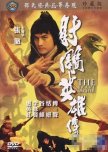
"I'm going to get revenge, I hope I see you later!"
The Brave Archer was Chang Cheh’s take on Legend of the Condors. This movie was the first of four following Kuo Tsing’s adventures. Chang was known for ushering in the more machismo and bloody era of kung fu so this film focusing on a romance was a rare departure for him.This film moved hard and fast through the source material. It had the longest intro of any kung fu movie I’ve ever seen. Not only did it have the typical narration explaining the basic historical setting but also the different characters and which group they belonged to during the opening on a stage. As someone who has not read the book it was my first clue that this two-hour film was going to be packed with characters with little time to develop.
The story began with the classic tale of two babies separated and trained by different people, babies who were born to be blood brothers but who ended up on opposite sides. Alexander Fu Sheng played the “clumsy, slow” but good-hearted Kuo Tsing who was trained by the 7 Weirds. He runs afoul of the deadly Iron Corpse Mui Chiu Fung. Later he befriends Huang Yung dressed as a boy with romance soon to blossom. There were not one, but two battles for marriage scenarios, someone came back from the dead, a large snake played a role in Kuo’s development as did two other masters he made the acquaintance of.
Famous kung fu faces passed by in nearly every scene. Alexander Fu Sheng played a perfect not too bright hero. Tien Niu as Huang was a fiery companion for him. Five actors from the Five Deadly Venoms had special appearances. Ku Feng made for an entertaining 9 Fingered Beggar, and one of my favorites to see. Johnny Wang in silver lamé looked every inch a bad guy. Kara Hui had a short, but important role along with Dick Wei. Yu Hoi Lun played the female fighter so fierce with her lethal Skeleton Claw technique that most of the men in her path ran away. There were four female warriors and not a bare breast in sight, just competent women.
The fights were unimpressive. Most of them were kung fu posing and not very fast. At least Ku Feng knew how to keep them interesting with his acting. Yu Hoi Lun scared her opponents with her fierceness rather than lightning speed. Philip Kwok showed off his athleticism with his slightly mad master in an awful wig. Shaw Brothers didn’t scrimp on the sets where all the action took place, including Peach Blossom Island.
If you’ve watched one of the dramas based on Jin Yong’s books or read the books themselves, this will likely look like a highlight reel. If you don’t have any experience with either, like me, the characters are tough to keep up with. I had to make a cheat sheet to remember the different characters and factions involved as the action moved quickly from one group to another and then suddenly came to a dead stop. For a 1977 Shaw Brothers movie it looked good and for a Chang Cheh 1970’s kung fu film it was a more well-rounded story than many of his were.
10 March 2024
Was this review helpful to you?
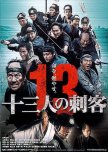
"Betting on yourself is true gambling"
13 Assassins managed to transcend the average samurai film not only with the political maneuverings but with a final hour that was explosive and thrilling. Two men on opposite sides had to decide if samurais serve their master or the people. The answer would be written in blood.Doi Toshitsura, the Shogun’s senior advisor, is appalled at the atrocities committed by Lord Naritsuga against noble families and commoners alike. Rape, torture, murder, dismemberments—everyone was a plaything to him. The Shogun refused to have him step down fearing chaos while Doi recognized that the vengeful clans would likely revolt when Naritsuga joined the Shogun counsel. Doi needs a solution and his turns out to be Shimada Shinzaemon, a retired samurai who worked under the previous Shogun. Shinza’s eyes light up when given the chance to help the people and die a glorious death. Shinza puts together a team of 12 samurai, “nobodies” who have no titles, families, or affiliations. His goal is to kill the Caligula of Japan on the lord’s annual trip home. Shinza’s old school buddy who works for Naritsuga stands in his way. Cunning and connected, Hanbei will prove a clever foil to Shinza’s plans.
The first hour or so of the film saw the reasons for the team and the team pulling together and training. “There’s no fair play in battle!” On the way to their destination, Shinza’s group picks up an unlikely ally that resembled Toshiro Mifune’s mad samurai in The Seven Samurai. The final 45 minutes of the film showed Shinza’s and director Miike Takashi’s genius. I’ve watched a lot of action films and never have I seen the element they used to great effect in this film. As expected, there were buckets and buckets of blood spilled but for the most part it never turned truly gory. The battle was brutal, with Samurais utilizing whatever weapons were nearby.
Yakusho Koji as Shinzaemon was perfect. He conveyed the warrior’s desire to return to battle, his horror at the cruel lord’s actions, patience when a strategy called for waiting, and humor even in the face of death. And above all, he displayed the sense of honor a samurai should have, not only for the Shogun, but also for the people. Most of the other 11 samurai were difficult to discern between. I was able to familiarize myself with about six of them. I wish they’d spent more time developing them. Inagaki Goro gave Naritsuga a mad emperor vibe that only grew stronger as the blood began to flow. The cinematography encompassed not only the towns and interiors, but the dense Japanese mountains the samurais had to trek through. Some of the shots were breathtaking.
13 Assassins maintained the tension of Samurais going against the code in order to murder the second man in charge for a greater good. Not one of the 13, well, maybe one, thought they would walk away alive and all were ready to die for their cause. The last 45 minutes was utterly thrilling with the explosive action and wondering if the 13 would succeed and if any of them would survive. If you enjoy samurai films, you’ll find few better than this one.
9 March 2024
Was this review helpful to you?
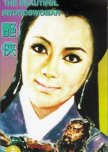
Yuan Yuan trains in secret and receives her assassin assignments from her old sifu. She and her governess disguise themselves in a myriad of ways, even as a new bride, in order to take down her targets. Her doting father never suspects his docile and obedient daughter has another side to her. Before long her secret life and her family life converge when she learns a devastating secret about her “father”.
The sword fights were pretty good for the time although there were a lot of swipe and falls. Yuan Yuan wasn’t afraid to aim for the face. Her nemesis used rings to kill his enemies. Wang Ling gave a strong performance as Yuan Yuan keeping the overacting so common in the 60’s to a minimum. Ma Chi played the loving father to the hilt and also the creepy murdering rapist.
There were some exciting fights early in the film and then it began to be dragged down in melodrama. The end was encumbered by the diametrically opposed familial cry for revenge and the punishment for killing a parent. Yuan Yuan was burdened with forgiving the unforgiveable and also settling her parents’ blood debt which seemed impossible. Family dynamics can be tricky.
6 March 2024
Was this review helpful to you?
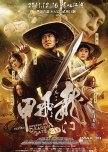
Stellar cast let down by mediocre writing and even worse special effects
Flying Swords of Dragon Gate was a remake of a remake. After watching it, I’m pretty convinced that was at least one remake too many. In lieu of quality martial arts fights, Tsui Hark buried the film in bad CGI and mediocre storytelling.It’s the Ming Dynasty which means the evil eunuchs are running amok. Zhao Huaian and his spunky rebels seek to take down the eunuchs and rescue the falsely accused. At the same time, a maid who was unfortunate enough to get impregnated by the emperor is on the run. Fear not! Eunuch Yu the head of the diabolical Western Bureau vows to have her hunted down and killed. A keen multi-tasker he is also determined to be rid of Zhao. The annoying maid is rescued by a female swordswoman and escorted to the Dragon Gate Inn in order to avoid a deadly sandstorm. The inn becomes overly crowded with a group of rowdy Tartars, Eunuch Yu’s men, and a dead ringer for Yu named Wind Blade. Eventually, Zhao shows up as well because the inn in the middle of nowhere is a magnet for killers and heroes alike. Everyone has their reason for being there and hidden treasure buried in the desert makes strange bedfellows with unlikely alliances.
This movie was 2 hours long but felt closer to 2 days. With the exception of the female Tartar warrior, none of the characters were particularly engaging. Aside from Burudu, I didn’t really care if any of them walked away from the inn where you did NOT want to be served “white” meat. Chen Kun played dual roles, but even he couldn’t save the lackluster writing. Jet Li acted bored as well. On the positive side the film had four accomplished female fighters. I was also happy to see old school kung fu movie star Gordon Liu in a guest role as one of the power hungry eunuchs brief as it was.
The film lacked character development and urgency for a story set in the only dwelling on the edge of nowhere filled with people wanting to kill each other. What could have been a tense claustrophobic thriller dragged on relentlessly with very little movement. The eunuch’s doppelgänger element was talked about more than used effectively. The romance clumsily wedged into the story was feeble at best. Five black sand tornadoes did little to liven things up.
Aside from the uninspired storytelling, what ruined this film for me was the terrible, and I mean atrocious CGI. The fights were ridiculously bad and completely reliant on CGI and green screens. The green screens were obvious as well. Nothing appeared real including the CGI actors that often bounced around. The sped up fake and real people fighting moved awkwardly instead of fluidly. Jet Li and Chen Kun’s fight in a tornado hurt my eyes there were so many bad effects going on. I kept expecting to see the woman riding her bike in the twister from The Wizard of Oz blow by. That’s not even taking into effect how fights were sped up and characters were thrown like paper airplanes. Most Wuxias in actual historical settings have some actions grounded in reality. People had limitless daggers stashed away in their sleeves. How their sleeves weren’t dragging the ground, I’ll never understand. Originally filmed for 3D, many of those daggers were hurled straight at the screen.
I enjoyed King Hu’s 1967 original Dragon Gate Inn no matter that the sword fights were primitive by today’s standards. At least they weren’t blurred and sped up to a ridiculous rate. I am a fan of Jet Li, Chen Kun, and Zhou Xun and I really wanted to like this film. The film ran too long, was narratively a mess, and relied too heavily on special effects instead of quality fight choreography. Flying Swords of Dragon Gate deserved to be buried in the sand.
5 March 2024
Was this review helpful to you?
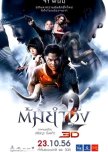
"You've lost your elephant again!?!"
Tony Jaa had to rescue his elephant little brother once again in Tom Yum Goong 2. Just as in the original, the story was a thin construct, simply there to let Jaa shine. This time he stayed in Thailand when he faced the dastardly devils who stole his elephant.Kham’s elephant is stolen (again!) by a bad guy who is working for a badder guy. When Kham arrives at his lair, the bad guy is dead and his two nieces skilled in martial arts think Kham did it. The cops have already been called to set him up so he has Sue Sue and Ping Ping (Jeeja Yanin) after him as well as the police force. Sgt. Mark, now working for Interpol, arrives on the scene. Kham ends up with what looks like the entire population of Bangkok chasing him on foot, motorcycle, and car! The Big Bad, LC, wants Kham to help him disrupt the peace process taking place in Bangkok for Kantana, a country divided. With his life and the life of his elephant on the line Kham has to find a way out or at least a way through the formidable fighters standing between him and his elephant.
The story, much like the first one, had plot holes galore. The acting was adequate. None of that was too important. Watching Tony Jaa and Jeeja Yanin fight was more than enough reason to hit play.
I’d read numerous complaints with people unhappy that Tony used wires and CGI in this film. While it was great he did amazing stunts without either in previous films, at 37, I didn’t understand what the big deal was. Jet Li, Donnie Yen, and Jackie Chan all used fighting enhancements, especially as they aged. It makes for more fantastical if not realistic fights. The wires and CGI didn’t bother me, what did was the almost indestructible nature of Kham, The Big Bad, and the #2 bad guy. In the original, Kham took people out in their vulnerable places and when people went down, they stayed down. Regardless of how they staged them there were several creative fights. The motorcycle battle and an electrically charged confrontation were quite creative. Jeeja Yanin took a backseat to Tony in the fights, but was still able to demonstrate what makes her an exciting fighter.
Tom Yum Goong 2 had a more polished look than the first film, but I missed the intense fight choreography. Unless the bad guys were zombies, I’m not sure how they kept getting up again and again. Apparently, Kham wasn’t hitting them very hard because even a hardened body is not indestructible. Kham also seemed made of impervious rubber. Having said that, I always enjoy watching Tony Jaa fight and this was no exception. Delephantly (couldn’t resist an elephant pun!) for Jaa and martial arts fans only.
3 March 2024
Was this review helpful to you?
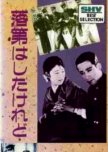
"What does flunked mean?"
I Flunked, But… was one of Ozu’s early silent films about university life. It was a warmhearted story demonstrating life’s ups and downs during and after university.Shomochi and his four buddies don’t take things too seriously as they cheat during exams and spend the evening before the big final exam cramming. Shomochi is the leader helping the others to study. He also prepares his white shirt as an answer guide. Nothing is ever that easy, especially when the house mom inadvertently collects the cheat sheet shirt along with the dirty clothes and gives it to the laundry services. The roommates panic at the loss. Much to everyone’s surprise the four roommates pass while Shomochi fails. The boys are sad for their friend, but Shomochi is devastated to not be able to graduate. Shomochi receives comfort from an unexpected source and finds his path toward adulthood and confidence. The four graduates discover the harsh reality of a disastrous economy where their diplomas mean very little.
Just as bachelor Ozu made numerous films about marriage and family life, he never attended university, so his take on it was more what he envisioned it to be than what he’d experienced. I enjoy Ozu's silent films, his style was more mobile. People moved naturally and looked at each other, not the camera, when they were talking. He wasn't rigid with filming from the mat and some shots were filmed from a higher position. The comedy felt organic and not forced. The boys had many humorous moments without delving completely into slapstick. I did miss his meticulously designed sets with the spare compositions. Of course, these were college boys and cluttered rooms were more realistic. An American movie poster and American university pennants decorated the walls. Ozu's teapot did receive prominent placement in one shot!
While there were many comedic moments, they alternated with sadness and discouragement. University life felt more insular. When the graduates faced the unforgiving economy, they were the ones needing help and encouragement. “Why did we have to graduate so fast?” Shomochi, on the other hand, moved toward maturity and finding joy in the moment.
This film shared the bonds formed from late night study sessions and walking arm and arm to a dance beat. Love brought encouragement in the darkest moments as did friendship. Maturity became a path adversity set them on. I Flunked, But… asked what it means to fail, and if one fails…what next? What happens when you do everything right but still can’t succeed? Ozu left some of those questions unanswered for the students who sought to find happiness amidst the sorrow and victory from failure.
25 February 2024
Was this review helpful to you?
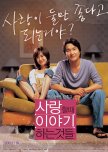
Sometime love ain't enough, and sometimes it is
Solace is a difficult movie to pigeonhole. While it is a romance, the leads spend large amounts of time apart. The pacing is slow like a slice of life and there are troubles enough for a melodrama. The leads involved occasionally find solace with each other, a gentle spot far removed from their daily grueling challenges.Somehow Lee Hye Ran has inherited her deceased father’s massive debt. I don’t understand Korean law and how it ended up with her and not her mom. Be that as it may, Hye Ran is drowning in debt and hounded by her father’s creditors. She runs a clothing shop where she often sells counterfeit clothing. Her sister is pregnant and getting married, adding to her financial concerns. Meanwhile, In Ku is a pharmacist living with his mother and mentally impaired brother, In Seob. His marriage plans fell through when the bride’s family forbade them to marry because of the brother’s condition. Neither Hye Ran nor In Ku are looking for love but fate insisted on throwing them together on several occasions. The two find comfort in each other’s company and arms, but regardless of their feelings, Hye Ran’s debt doesn't disappear and In Seob’s needs don't lessen.
Solace was a realistic look at two people for whom life could be a difficult grind. Realistically, love didn’t conquer all and solve all their problems. The film wasn’t all dreary and pessimistic. Both people were reminded of what they were missing. It instilled in them a desire to find joy in their lives whether it was listening to a familiar song or taking a hike. Speaking of music, it was a blast from another past to see a Walkman and a car with a cassette player in it. Both Hye Ran and In Ku had responsibilities they could not be released from. Opening their hearts to each other, helped them to open them to others. Sometimes love can be expressed in a myriad of ways, Solace explored love in different relationships, the joy it can bring, and the loving sacrifices people make for each other. While not a traditional romance, it was a film that stayed true to itself.
24 February 2024
Was this review helpful to you?
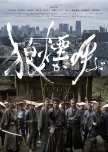
An heirloom's hidden past...
Wolf’s Calling is a stylish short film by director Toyoda Toshiaki with no dialogue. It is truly a mood piece bordering on samurai music video. This is the first film in his Resurrection trilogy followed by The Day of Destruction.A young woman discovers a rusty revolver in a box and takes it out. The memories imbued in the cold steel open up for the audience. Several samurai gather at the Mountain Resurrection Temple-Wolf. Soldiers in blue uniforms join them shouting, the only human sounds in the film. A woman’s sash and hairpin are laid out by one samurai and another carries a child’s toy implying the reasons for their solemn assembly. They silently form ranks with knowing glances. Drums echo the sounds of the approaching enemy. Weapons are drawn as well as the revolver.
An impressive cast lent weight to the performances making me wish this had been a full-length film. While the samurai might have been avenging loved ones, the real inspiration for the film had more to do with Toyoda’s arrest for possessing an illegal firearm, cleared up when it was shown that it was a family heirloom dating back to WWII. Like him, when looking at family heirlooms I wonder about the stories and people behind them.
Though Wolf’s Calling was a short film, the shots of the warriors walking through the old growth forest to the temple were resplendent. The temple was used in this film and The Day of Destruction, I have yet to watch the third film. The Young American revolver style was first made in 1905 which if they did their homework would help to date the action in the past. The music filled in for the dialogue conveying the urgency and determination of the men involved. The body language of the actors also conveyed their deadly resolve.
The film is so short that I watched it twice, enjoying it more the second time. The acting, scenery, and music gave the glimpse into the family’s past a depth that in lesser hands would have fallen flat. After watching Wolf’s Calling and The Day of Destruction which were both low budget films, I’m looking forward to trying more of his work. If you’ve never watched a silent film this might be a good gateway film.
23 February 2024
Was this review helpful to you?
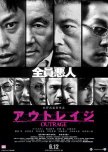
"You know you are dealing with the yukuza, right?"
Outrage began the trilogy focusing on director Beat Takeshi’s traditional yakuza Otomo. The film could become wearisome as betrayal after betrayal ended in gruesome deaths for those up and down the yakuza ladder of power.The film’s plot could be hard to follow, or at least all of the players, as the Sanno family chairman started maneuvering all of his family’s subfamilies and tributaries, not realizing he was being played as well. The Murase family is in the chairman’s sights and soon the murders and torture scenes are ongoing. Even the ambassador from Ghana is dragged into their schemes. Dental equipment, a giant snake, chopsticks, knives, guns, and bombs. No one is safe as brother turns against brother, and even girlfriends are hunted down. There truly is no honor among thieves. Or among the police. Tokyo’s finest looked the other way and counted the money in their envelopes as the bodies started dropping.
My biggest problem with Outrage was that there was no one to feel sympathy for, as twisted as that sounds when watching a gangster movie. Everyone could have died a gory death, and many did, but it really meant nothing. They were all killers looking to make a buck and gain more power. Otomo had the old yakuza honor thing going for him, but he was just a deadly pawn easily used because he followed orders without asking questions for much of the movie.
Outrage had moments that were entertaining and the big plot reveal at the end helped to explain some of the mayhem. Character development of a few key figures would have helped enormously. Otherwise, it just felt like random people getting chopsticks jammed in their ears or eating bullets for lunch. In the end, killers killed killers who killed killers who killed killers…
17 February 2024
Was this review helpful to you?

"Bitterness has its own flavor"
Coffee or Tea was a light hearted comedy about three young men who were at different places in their lives where their dreams were concerned. One had given up on his dreams and life. The second man was enthusiastically ready to bet everything on his dream. The third was swimming in circles with his dream, held back by his relationship with his father. They met up, forged a friendship and business that would guide them all in the same direction and help them each to grow as individuals.Wei Jin Bei is at the end of his rope after his most recent failed business attempt. Unable to sleep, he’s ready to give up on life when effervescent deliveryman Peng Xiu Bing steps in. Peng is going to his remote hometown to begin his own delivery business and takes an extremely reluctant Wei with him. Peng’s village relies on growing tea, but with the depressed prices has lost most of its young people. Peng is determined to reinvigorate the people and town even when he meets with failure. It will take a chance meeting to help turn both his and Wei’s fortunes around.
Peng Yu Chang as Peng was a bright ball of positive sunshine radiating energy on his more dour buddies. Liu Hao Ran played the glum business brains from Beijing transformed by the small village. He often seemed obscured by his floppy hair and large glasses. Yin Fang’s Li Shao Qun had the least development as the rebellious coffee grower who was alienated from his father. The acting wasn’t particularly nuanced, but then again, neither was the story. Along with the business elements there were whimsical animals. What movie doesn't need a talking pig?
Coffee or Tea was a feel good movie about friendship and determination with gentle humor that avoided being cringeworthy for the most part. The film streamlined the story and glossed over the obvious business hurdles as well as the timeline. Most of this could be forgiven as the focus was on the camaraderie of the young men as they healed themselves and their relationships. The film was respectful of traditions and the older generations. At the same time, it also showed that there were times when innovation and new paths must be cut in order to survive as the world evolves. The enduring relationships and new friendships forged proved to be the key to success and reconciliation. While Coffee or Tea could be simplistic and felt low budget, it’s one of those easy movies you can watch if you are looking for a mood lifter.
12 February 2024
Was this review helpful to you?
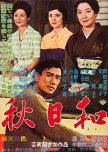
"Love and marriage aren't always the same thing"
Late Autumn was in many ways a reworking of Ozu’s classic 1949 film Late Spring only this time focusing on a widowed mother and her daughter of marriage age. Three friends of her late husband decided they knew what was best by finding not only a mate for the daughter but the mother as well! Regardless of what the women wanted.At the memorial service for their friend Miwa, three old friends, Mamiya, Hirayama, and Taguchi ask Miwa’s widow, Akiko, if she would like help matchmaking for her daughter Ayako. She agrees and after she’s left the men discuss how much each one of them had a crush on Akiko when they were younger, not always in the most respectful ways. The men get to work finding a suitable prospect but run into a wall when they discover Ayako doesn’t want to wed for she fears leaving her mother alone. That knowledge only spurs them on. Mamiya finds out by accident that Ayako has started dating one of the prospects she’d rejected. When he called her on it she said it didn’t change anything. Love and marriage were not necessarily the same thing. The men change tactics and decide to have Akiko marry one of them which turns her small, quiet household upside-down!
Despite their sometimes crass language, the three men’s hearts were in the right place. They wanted the best for Akiko and Ayako. There was more innuendo in this film than most Ozu films. I really didn’t need to hear about the men’s “itches”. Akiko and Ayako had a close relationship that was tested. Fortunately for all involved, Ayako’s friend, Yuriko, stepped in and sorted the men out in the best scene of the whole movie. She then went to work on the mother and daughter.
Ayako feared marriage would cause her to lose her friends as she’d seen with her own friends that married. She also feared becoming distant from her mother and leaving her mother alone, with no one. Despite not being as independent as Yuriko, she enjoyed her independence and feared losing it, too. Akiko, with Hara Setsuko playing her, was the epitome of grace and generosity. The three men were all a little in love with her which even their wives knew.
Ozu’s palette was much the same-muted colors highlighted with green, yellow, and his favorite color red. His red teapot was replaced by a prominent yellow one here. The steady camera set low with the people moving instead was a constant as well as the intricately composed frames. Many of the same players from previous films showed up here like old friends. There’s a comfort and familiarity with his post-war films.
Despite having covered much of the same topics in previous films-the changing Japanese family, aging, and loneliness, he still had more to say. I enjoyed this film more than Late Spring with Hara as the mother instead of the daughter. Okada Mariko’s presence gave the film a jolt of energy when the talking began to go in circles. As bachelor Ozu aged, so did it seems, the boys from his silent films. Still incorrigible with good hearts, only now old men sitting together drinking sake and meddling in other people’s lives…with good intentions of course.
6 February 2024
Was this review helpful to you?
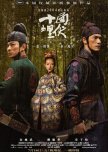
"The wind breezes through without a trace"
House of Flying Daggers was a movie where style over substance wasn’t a failing. Zhang Yi Mou pulled out his magical color palette and bathed the screen with gorgeous deep hues. Beautiful people wore luxurious costumes as they danced, fought, and loved in the kaleidoscope background. This director knows how to hit all my film watching pleasure spots through sight and sound.The plot is fairly simple. With a failing and corrupt government, the underground House of Daggers grew into being. Stealing from the rich and helping the poor while fighting against the crooked officials they’ve earned a target on their backs. Jin and Liu are tasked with bringing down the Daggers’ leader. They suspect the new blind dancer at the Peony Pavilion is the daughter of the recently deceased leader and seek to use her to guide them to the alliance through subterfuge. Jin goes undercover as someone taken with her beauty and breaks her out of jail. The only problem is, “who’s zoomin’ who?”
The thin storyline worked largely due to the commitment of Zhang Zi Yi and Kaneshiro Takeshi in playing adversaries pretending to have fallen for each other, especially when their true feelings begin to trip them up. Their relationship evolves from brutal possession to erotic whispering caresses. Treachery and zealous devotion played out both personally and professionally for a number of people. The twists and turns may not have been earthshattering but they were entertaining. They also showed how little value was put on the lives of the pawns in the game between two powerful forces.
Tony Ching choreographed numerous wire-fu fights with swords and speeding daggers. The battle in the bamboo forest was stunning. Soldiers crawling up and down the verdant trees while also using them as weapons was enthralling. For the most part people were shown full body length in order to observe the intensity of the fights. When the bamboo shatters or impales it was both beautiful and shocking. The singing daggers could bend in flight and bank off of objects to land their targets. While not a fight, Zhang Zi Yi’s dance with the drums was breathtaking and quite memorable. Zhang Jianmin’s dance choreography flowed with power equal to any fight in the film. The percussion ballet was as magnificent as the bamboo one.
Umebayashi Shigeru’s score could be wistful one moment and heart pounding the next. Romantic, playful, traditional and modern, the music enhanced every scene. Zhang’s use of color never ceases to amaze me. Whether in the feminine Peony Pavilion with pink dresses and butterflies or the autumnal trees and falling leaves of the forest, he never neglects the important visual aspects of his films. As mentioned before, the emerald bamboo battle was one of the most iconic scenes from his films.
Mei and Jin’s life and death decisions were made in the sheer elegance and poetry of Zhang’s visual style accompanied by a haunting score. The plot involving both personal and national passions played out in the forests, fields of flowers, and snow. It’s hard to say which was more captivating, I tend to lose my sense of perspective when immersed in Zhang Yi Mou’s world.
3 February 2024
Was this review helpful to you?
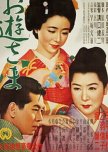
"I never realized how heavy this kimono was"
Love triangles can be problematic, especially when communication isn’t encouraged and everyone is guided by rigid social principles. Two loving sisters ended up in a trap of their own making when society denied them the freedom to make their own choices in Miss Oyu.Shinnosuke has resisted every marital prospect until Shizu’s entourage approaches his house and he falls in love at first sight. The only problem---the woman he fell in love with was Shizu’s older widowed sister, Oyu. Known for her beauty and elegance, Oyu was tied to her late husband’s family and couldn’t leave because she had given birth to the heir. Oyu pushes for Shizu to marry Shinnosuke because she wants to stay near her sister. Before long the three are inseparable. Unknown to Oyu, Shizu announced on her wedding night to her husband that she intended to be married in name only because she knew he loved her sister and her sister loved him. This sisterly sacrifice led to more heartache for all involved, primarily for the sisters.
Director Mizoguchi and cinematographer Miyagawa created a treat for the eyes in black and white. The scenery, sets, and costumes were luxurious. Similar to Kurosawa, he framed his scenes with action in the foreground and background, giving the scenes visual depth and interest. The traditional music haunted the film with melancholy as the characters dealt with their repressed emotions.
Tanaka Kinuyo and Otowa Nobuko were the heart of the film, conveying sisters deeply committed to each. Hori Yuji looked like he just came along for the ride. His immature and passive Shinnosuke barely registered on the screen when the two women were around. Was Oyu truly, passionately, in love with Shinnosuke? As far as the story went, it was difficult to determine what Oyu’s feelings truly were. She kept them neatly tucked. Was she in love? Flattered? Or oblivious to Shinnosuke’s love? When scandal threatened, she set the married couple straight in what their obligations to each other were. What drove Shizu’s need to sacrifice her own happiness and future? What debt could she possibly owe her sister? The writers weren’t telling and the actors weren’t giving many clues either as to why the trio was willing to dance on the edge of a knife where any mistake would lead to devastating scandals and familial reprisals.
Miss Oyu was visually interesting, the three people tragically caught up in a silent triangle of repressed feelings not so much. Tanaka and Otowa did their best to infuse intensity into the story but were confined by the writers and the film's societal norms.
30 January 2024
Was this review helpful to you?

 54
54 188
188 11
11






















